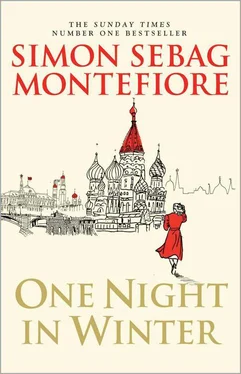‘Shall we have a glass of champagnski before we go in?’ suggested Minka, always the bon viveur of the three.
In the bar, they caught the attention of some American airmen. Joshing, toothsome, young, they were so smart in their uniforms, and their skin was as unblemished as a baby’s – and what teeth, Serafima noted, compared with the weathered complexions and golden fangs of Russian men. They possessed a lightness that she admired, even as she stood back a little awkwardly. She was happy for Minka and Rosa to flirt, and the men did not seem to notice her at all.
One of the Americans, an air force captain, a broad-shouldered athlete with a buzz cut, asked Minka for her telephone number but she did not give it to him, her refusal making her even more desirable. The other Americans teased him, ‘Oh, he don’t often get turned down! There’s a challenge, Bradley!’
Sensible Minka, thought Serafima, however much fun this might be. The rules had loosened in wartime but her father had warned her that the Party would reinforce them again afterwards. Bradley, spurred on by his friends, not only insisted on buying them four rounds of drinks but offered them some tickets in a box. ‘We’ve got some extra seats,’ he said.
‘Why don’t you need them?’ asked Minka in the perfect English she had learned in Tamara Satinova’s class.
‘We can’t stay for the show, so please take them,’ Bradley said. ‘The box will just be empty if you don’t.’
‘You’re just here for the drinks?’ said Minka.
‘And the dames!’ cried one of Bradley’s friends.
‘We’re going out to eat as soon as the play starts,’ said Bradley.
Filled with uniformed foreigners and Russian girls, the Bolshoi was the centre of all social life in Moscow, so it didn’t surprise Serafima that Bradley and his American friends were not remotely interested in Prokofiev. Even she, Rosa and Minka had seen it so often they could have danced it themselves.
‘Hey,’ Bradley continued, flashing his amazing American teeth, white and clean and big as icebergs. ‘Wanna join us for dinner?’
‘I’m sure you’ll find some girls who aren’t here for the ballet,’ replied Minka, now suddenly haughty and mock-serious. ‘But we are.’
SATINOV WAS STILL in East Prussia a week later. It was evening and he was in the baronial hall of a country house that was now the headquarters of the First Belorussian Front. The first Soviet troops to break into the schloss had urinated and defecated on the count’s four-poster bed (once slept in by Frederick the Great, according to a gardener who showed them round) and fired at the oil paintings of bewhiskered Junkers, and although the house had since been cleaned up, Satinov could still see the bullet marks on the walls.
‘I think the full staff can join us for dinner tonight, don’t you, Hercules?’ said Marshal Rokossovsky. They were friends, even though Rokossovsky was a real soldier, and he, Satinov, was a Party man, a member of the State Defence Committee, and Stalin’s representative.
‘Why not?’ answered Satinov, who understood by ‘full staff’ that Rokossovsky meant that the generals could invite their PPZhs (it stood for pokhodno-polevaya zhena – a field campaign wife, a pun on the Soviet machine-gun the PPSh). ‘It’s time everyone relaxed. We’ve earned it, after all.’
He looked across at Rokossovsky and raised his eyebrows as they both acknowledged the sound of shooting and cowboy whooping outside. Losha and the bodyguards were culling dinner in the deer park from their jeeps. They too were in good spirits.
Coming down for dinner that evening, Satinov relished the delicious aroma of roasting venison, the sweet smoke of apple-tree wood in the fire, and, he thought, the scent of the women present. Rokossovsky, elegant descendant of Polish nobility, enjoyed female company but disliked any hint of debauchery in his decorous headquarters. This suited Satinov, who was happily married, hated drunkenness and disapproved of womanizers.
In the hall, Marshal Rokossovsky and his staff were at the table. Young female orderlies in khaki were serving plates of steaming venison piled with vegetables and pouring glasses of wine for the officers. Rokossovsky’s batman was fanning the fire in the great open fireplace, and Satinov’s guards were carrying up boxes of wine from the cellars.
Rokossovsky was sitting beside the young telephonist who was his PPZh. Satinov took his place at the other end of the table.
‘Comrade Satinov,’ Rokossovsky called down the table, pointing to a pale man. ‘You already know Comrade Genrikh Dorov from the Central Committee?’
‘I certainly do. Comrade Dorov, welcome!’ said Satinov. He smiled, remembering that George and his friends called Genrikh the Uncooked Chicken. How right they were, he thought, feeling an unexpected stab of longing for the company of his sons (and the one he’d lost).
‘Thank you. I’m here to inspect food supplies and root out wreckers and profiteers,’ said Dorov.
Ah, that made sense, Satinov decided, recalling how, in 1937, Genrikh Dorov had metamorphosed from an inky-fingered, hero-worshipping assistant in Stalin’s private office into a demented executioner. The more executions, the whiter his hair, the paler his skin became. In the first year of the war, his shootings (sometimes using his own pistol) and military bungles cost the lives of thousands. Finally Stalin himself (who regarded him as a talentless but devoted fanatic) had demoted him.
‘I report to the Central Committee tomorrow,’ said Genrikh, so that everyone could hear. ‘It’s a den of iniquity out here. Adultery. Booze. Corruption. We must restore Bolshevik morals.’
But Satinov was looking at the woman sitting next to Dorov. ‘My wife,’ said Genrikh, following his gaze. ‘Have you met her?’
And there was the female doctor in the blue-tabbed uniform of the medical corps with the red cross on her sleeve.
‘Dashka Dorova,’ she said, offering her hand. Satinov noticed her slightly plump, amber-skinned wrist. ‘Yes, we’ve met before.’
‘Of course but…’
‘But what?’ A crooked smile, challenging caramel-brown eyes.
What was he trying to say? That he was surprised that the unattractive pedant Dorov was married to this beautiful doctor?
She leaned towards him. ‘Did you know our children are at the same school? My daughter Minka knows your sons.’
‘School 801? I didn’t, but you know, I’ve never been there. I’ve been at the front for so long.’
‘Where did you meet?’ asked Dorov. ‘You just said you’d met. I’d like to know.’
‘At a little hospital in a village a few days ago,’ explained Dashka soothingly. ‘A whole unit was poisoned by alcohol…’
‘Christ! What a waste of manpower,’ Dorov said. ‘Did you shoot the suppliers for sabotage?’
‘No, dear,’ Dashka replied. ‘I was trying to save their lives.’
‘Did we lose any more?’ asked Satinov.
‘No,’ she said. ‘Oh, and thank you so much for the mattresses and supplies. I was very surprised when they arrived.’
‘You didn’t think I’d remember, did you?’
‘No,’ she said, smiling, her features softening. ‘No, I didn’t.’
‘Would you have bothered with the supplies if she’d been an ugly male doctor?’ asked Dorov.
Satinov looked at him coldly. ‘How long are you with us, Comrade Dorov?’
But Dorov had turned away.
‘Excuse me, comrades, but Comrade Dorov, your plane for Moscow is waiting,’ reported one of the aides-de-camp, saluting.
‘I’ll help you pack,’ said Dashka, standing up.
After the Dorovs had gone, there was silence around the table. Genrikh Dorov was as disliked as he was feared. Then Rokossovsky winked, everyone laughed, and the conversation started again.
Читать дальше












